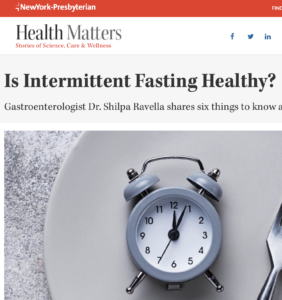May 25, 2018
Fasting to improve health has been around for thousands of years, with early support from Hippocrates and Plato. From an evolutionary perspective, our habit of having three meals a day (plus snacks) is abnormal. For much of human history, access to food was sporadic, especially for hunters-gatherers. We have fat tissue with energy reserves that can support the body for weeks if we are unable to access food.
Human and animal studies have shown that fasting for 2-5 days each month can reduce biomarkers for diabetes, cancer and heart disease. Our bodies store sugar in the form of glycogen. During fasting, glycogen stores are depleted, setting off biochemical pathways that can have healing benefits. Fasting lowers insulin as well as a hormone called insulin-like growth factor (IGF-1), which is linked to cancer and diabetes. When you lower insulin and IGF-1, cells get out of growth mode and enter a state of maintenance, which can help slow the aging process and decreases disease risk factors. Studies have also shown that fasting can improve symptoms in patients with autoimmune diseases.
There is evidence that fasting can promote weight loss. One study showed that alternate-day fasting in obese adults resulted in weight loss (an average of 13lbs) as well as reductions in LDL cholesterol, blood pressure, triglycerides and insulin.
There are different ways to fast. The 5:2 diet involves eating without restrictions for five days and then eating 500 calories on each of the remaining days. Alternate-day fasting involves eating 500 calories every other day. There is also time-restricted feeding, in which you consume all your calories for the day in a narrow window, usually around eight or nine hours. Human and animal studies have shown that fasting for as little as 16 hours can improve some health measures and counteract disease processes, including lowering cancer risk and maintaining a healthy weight.
One 2014 experiment found that mice that consumed all their calories during an eight-to-nine-hour period lost up to 12% of their body weight and also cut bad cholesterol and inflammation, compared with mice who ate the same quantity and types of foods spread throughout the day.
If you’re going to reduce calories, you have to eat a very healthy diet to avoid malnutrition. Fasting is not appropriate for pregnant women, people with diabetes, or people with other conditions requiring certain medications. Talk to your doctor and nutritionist before you attempt an intermittent fasting program.
Read more at NYP Health Matters


